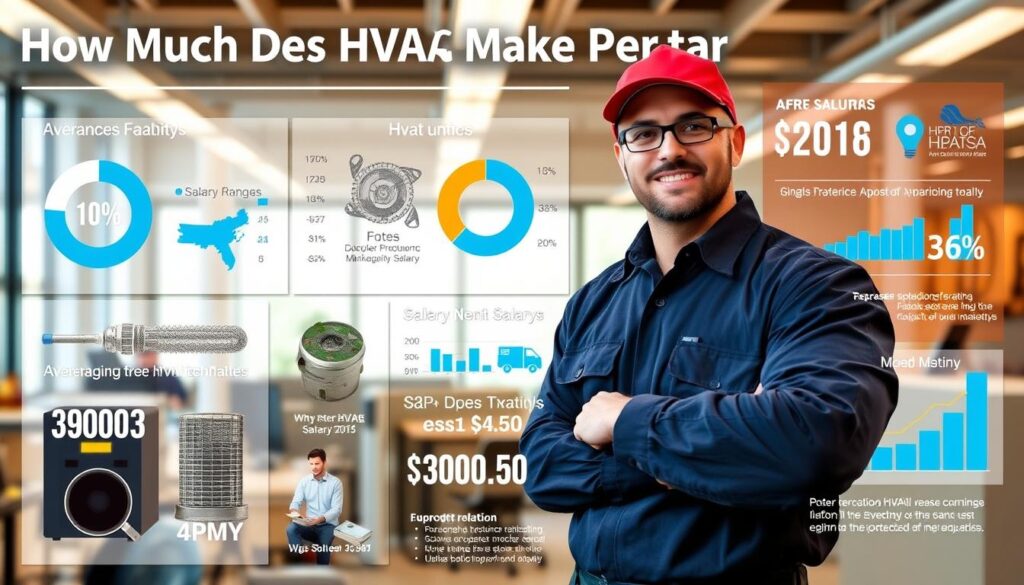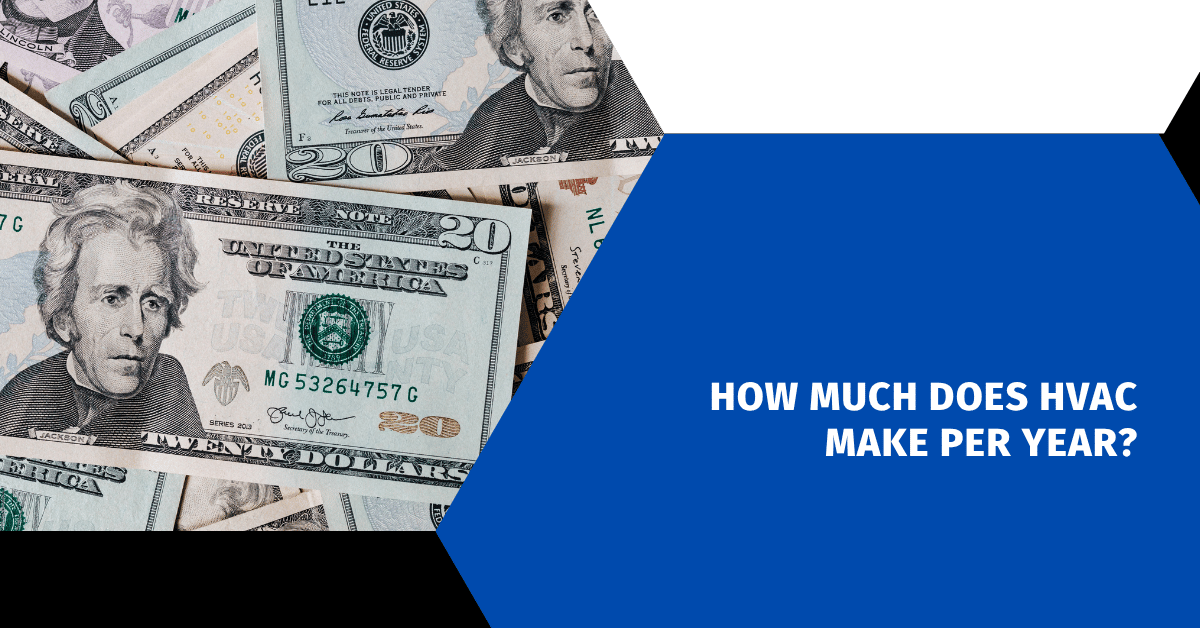Affiliate Disclosure
HVAC Guide Guys is a participant in the Amazon Services LLC Associates Program, an affiliate advertising program designed to provide a means for sites to earn advertising fees by advertising and linking to Amazon.
How Much Does HVAC Make Per Year? Ever thought about how much HVAC workers make? Wondered if it’s a good career choice? The HVAC field offers great pay and exciting opportunities.

HVAC technicians keep places warm and cool. They need special skills, which means they get paid well. On average, they make between $46,000 and $68,000 a year. Those with more experience can earn even more.
How much an HVAC technician makes depends on several things. These include their experience, where they work, their specialty, and how much demand there is. These factors can greatly affect their salary.
Key Takeaways
- Average HVAC technician salary ranges from $46,000 to $68,000
- Hourly rates typically start around $29.00
- Earnings depend on experience, location, and specialization
- Career growth is strong in the HVAC industry
- Certifications can increase your income
Table of Contents
Understanding HVAC Technician Salaries in the United States
HVAC technician salaries vary a lot in the United States. Many things affect how much they earn each year. Knowing about these salaries can help both current and future HVAC technicians make better career choices.
The salary range for HVAC technicians shows the wide range of opportunities in this field. How much you earn depends on several important factors.
National Average Salary Insights
HVAC technicians usually get good pay for their unique skills and knowledge. The median salary gives a clear idea of what they can earn:
- Median Annual Salary: $50,590
- Lowest 10% Earnings: Approximately $31,000
- Highest 10% Earnings: Around $80,000
Key Factors Influencing Base Pay
Several key factors can affect how much an HVAC technician earns:
- Geographic Location: Salaries vary a lot by state and region
- Experience Level: As you gain more experience, your salary goes up
- Specialization: Having advanced certifications or niche skills can boost your income
Median Annual Earnings Breakdown
Here’s a closer look at how much HVAC technicians earn each year:
| Experience Level | Median Annual Salary |
|---|---|
| Entry-Level (0-2 years) | $35,000 – $42,000 |
| Mid-Career (3-5 years) | $45,000 – $55,000 |
| Experienced (6-10 years) | $55,000 – $70,000 |
| Senior Level (10+ years) | $70,000 – $80,000 |
Knowing these salary trends can help you plan your HVAC career better. It can also help you aim for higher earnings.
How Much Does HVAC Make Per Year: Complete Salary Breakdown
Knowing how much you can earn in HVAC is key if you’re thinking about a career in heating, ventilation, and air conditioning. The HVAC field offers good pay, but it depends on several important factors.
Your earnings in HVAC can change based on your experience, what you specialize in, and where you work. Newbies and experienced pros earn differently.
- Entry-level technicians: $35,000 – $52,300 annually
- Mid-career professionals: $52,300 – $65,000
- Experienced technicians: $65,000 – $74,500
- Supervisory positions: $74,500 – $87,700
Now, let’s look at salary ranges for different HVAC career levels:
| Experience Level | Annual Salary Range | Hourly Rate |
|---|---|---|
| Entry-Level (0-2 years) | $35,000 – $52,300 | $16.80 – $25.10 |
| Mid-Career (3-6 years) | $52,300 – $65,000 | $25.10 – $31.25 |
| Experienced (7-10 years) | $65,000 – $74,500 | $31.25 – $35.80 |
| Supervisory (10+ years) | $74,500 – $87,700 | $35.80 – $42.16 |
“Your HVAC career is as good as you make it. It’s all about your skills, hard work, and eagerness to learn.” – HVAC Industry Expert
Pro tip: Getting better at complex systems or getting advanced certifications can really up your pay in HVAC.
Explore Our HVAC Shop
Looking for top-rated HVAC tools, parts, and accessories? Visit our shop and find the perfect solution for your needs.
Visit the ShopExperience Levels and Their Impact on HVAC Earnings
Your HVAC career journey affects your pay and earning power. As you gain experience, your salary increases. Knowing how experience levels impact your salary helps you plan your career.
The HVAC industry values skill and expertise. Your income grows as you progress through your career. This reflects your growing knowledge and technical skills.
Entry-Level Positions (0-5 years)
At the start of your HVAC career, you earn about $25.14 per hour. You’ll focus on:
- Learning basic technical skills
- Understanding system installations
- Developing customer service skills
- Gaining hands-on experience
Mid-Career Earnings (6-9 years)
With 6-9 years of experience, your pay increases to about $29 per hour. You’ll develop:
- Advanced troubleshooting skills
- Specialized system knowledge
- Increased technical complexity
- Leadership skills
Senior Level Income (10+ years)
Experienced HVAC professionals earn around $35.82 per hour after 10+ years. At this level, you’ll see:
- Expert-level technical skills
- Complex project management
- Consulting and training roles
- Potential business ownership
| Experience Level | Hourly Rate | Annual Equivalent |
|---|---|---|
| Entry-Level (0-5 years) | $25.14 | $52,291 |
| Mid-Career (6-9 years) | $29.00 | $60,320 |
| Senior Level (10+ years) | $35.82 | $74,506 |
Your commitment to learning and skill improvement drives your career growth and income.
Top-Paying States for HVAC Technicians
Your earnings as an HVAC technician can change a lot based on where you work. Some places pay a lot more than others. This makes where you live very important for your income.
Knowing which states pay the most can help you plan your career. It might even mean moving to a new place. The salaries for HVAC jobs vary a lot by location.
| State | Average Annual Salary | Hourly Rate |
|---|---|---|
| Alaska | $75,660 | $36.37 |
| Massachusetts | $73,300 | $35.24 |
| New Jersey | $70,500 | $33.90 |
| Washington | $68,940 | $33.15 |
| Connecticut | $67,610 | $32.50 |
Several things can make salaries higher in certain states:
- Complex climate conditions needing advanced HVAC systems
- Higher cost of living
- Strong construction and industrial sectors
- Presence of unions
- More demand for special HVAC services
“Location can be a game-changer in your HVAC career earnings.” – HVAC Industry Expert
Pro tip: While these states have higher salaries, think about the cost of living and job competition. This can help you decide if moving is right for you.
Explore Our HVAC Shop
Looking for top-rated HVAC tools, parts, and accessories? Visit our shop and find the perfect solution for your needs.
Visit the ShopCommercial vs Residential HVAC Salary Differences
When looking into HVAC salaries, it’s key to know the differences between commercial and residential sectors. The HVAC field offers various paths with big pay differences based on what you specialize in.
Choosing between commercial and residential HVAC can greatly affect your salary. Each area has its own financial landscape and career growth chances.
Commercial HVAC Compensation Structure
Commercial HVAC jobs usually pay more because they require complex systems and special skills. Technicians in this field handle:
- Large-scale industrial cooling systems
- Advanced climate control infrastructure
- Sophisticated building management networks
Residential Service Pay Rates
Residential HVAC techs earn less but more consistently than commercial ones. Their pay depends on:
- Local market demand
- Service complexity
- Residential equipment types
Specialized System Maintenance Income
Those who focus on specialized maintenance can really boost their salary. Being an expert in certain systems opens up high-earning chances.
| Specialization | Average Annual Earnings | Complexity Level |
|---|---|---|
| Commercial HVAC | $68,000 – $85,000 | High |
| Residential HVAC | $50,000 – $65,000 | Medium |
| Specialized Systems | $75,000 – $95,000 | Very High |
Your HVAC career path depends on choosing the right specialization and keeping your skills sharp. Picking the right sector can really impact your yearly earnings in this fast-paced field.
Career Advancement and Income Growth Opportunities

Being an HVAC technician opens doors to exciting career growth and higher earnings. The field offers many ways to improve your skills and increase your income. This is true even for those starting out.
There are several ways to advance in the HVAC field:
- Supervisory and Management Roles
- Specialized Technical Expertise
- Business Ownership
- Advanced Technical Certifications
Moving up to supervisory roles can greatly boost your income. Those who become managers can earn around $87,700 per year. This requires leadership skills, technical knowledge, and lots of experience.
Starting your own HVAC business is another way to make more money. Independent contractors and business owners often earn more than those in traditional jobs. This path needs entrepreneurial skills, technical know-how, and great customer service.
Here are some key steps for career growth:
- Pursue advanced technical training
- Get specialized certifications
- Build strong customer relationships
- Stay up-to-date with new HVAC technologies
Staying committed to learning and growing is key. It will help you make the most of your HVAC technician career and open up more opportunities in this fast-changing field.
Explore Our HVAC Shop
Looking for top-rated HVAC tools, parts, and accessories? Visit our shop and find the perfect solution for your needs.
Visit the ShopEssential Certifications for Higher HVAC Earnings
To move up in the HVAC field, you need more than just skills. Getting professional certifications can really up your hvac wage rate and overall earnings. Choosing the right certifications can lead to better jobs and more money.
Certifications show you’re an expert and serious about HVAC. They prove your technical skills and can raise your pay.
EPA Certification Impact
The Environmental Protection Agency (EPA) 608 Certification is key for HVAC techs. It lets you work with refrigerants and boosts your job appeal:
- Legally needed for refrigerant work
- Shows you care about the environment
- Usually raises starting pay by 5-10%
NATE Certification Benefits
North American Technician Excellence (NATE) certification is the top credential in HVAC. It shows you’re very skilled:
- Confirms you have top technical skills
- Can raise your hourly pay by $2-$4
- Top employers want you
Specialty Certifications Value
Specialized certifications can also increase your earnings. Think about getting certified in:
- Commercial HVAC systems
- Green technology
- Advanced control systems
Each certification is an investment in your career. It can lead to more money and more job options.
Regional Salary Variations and Cost of Living Adjustments

Your HVAC pay scale can change a lot based on where you live in the United States. Location is key in figuring out your hvac income. There are big salary differences across different regions.
Some states pay HVAC technicians more because of market conditions and living costs. For instance, technicians in big cities like Alaska, Massachusetts, and California make more. This is compared to rural areas in the South.
- Highest Paying Regions:
- Alaska: Top compensation rates
- Massachusetts: Competitive urban markets
- California: Technology and construction boom
- Lower Paying Regions:
- Mississippi: Lower living costs
- Arkansas: Limited industrial infrastructure
- New Mexico: Smaller HVAC markets
Knowing about regional salary differences helps plan your HVAC career. Cost of living adjustments are key when looking at job opportunities. A high salary in an expensive city might not buy as much as a moderate wage in a cheaper place.
“Your earning isn’t just about the paycheck. It’s about how far that money goes in your area.”
When looking at jobs, check local market rates, living costs, and growth in different places. This helps you make the most of your HVAC career earnings.
Industry Trends Affecting HVAC Technician Compensation
The HVAC industry is changing fast, affecting how much technicians earn. With a 9% job growth from 2023 to 2033, your earning power will grow. These changes bring new chances for skilled workers.
New technologies are changing HVAC jobs. Smart homes and energy-saving systems need special skills. This could raise your income. Those who keep up with new tech will be in demand.
- Emerging smart HVAC technologies
- Green energy system installations
- Advanced diagnostic equipment expertise
- Sustainable design integration
Here are key trends that could boost your earnings:
| Trend | Potential Impact on Earnings |
|---|---|
| Energy Efficiency Regulations | 15-20% salary increase possible |
| Smart Home Technology | 10-25% more earning power |
| Renewable Energy Integration | More chances for specialized roles |
To stay ahead, keep learning. Invest in your skills, get special certifications, and be ready for new tech. Your dedication to learning will lead to better pay and career growth.
Explore Our HVAC Shop
Looking for top-rated HVAC tools, parts, and accessories? Visit our shop and find the perfect solution for your needs.
Visit the ShopMaximizing Your HVAC Career Earnings
To boost your HVAC salary, plan strategically and keep learning. Knowing how much HVAC workers make can inspire you to find ways to earn more in this exciting field.
Here are some top ways to increase your HVAC salary:
- Pursue advanced professional certifications
- Develop specialized technical skills
- Explore leadership and management positions
- Build a strong professional network
- Stay updated on emerging industry technologies
Certifications can really help your earnings. The North American Technician Excellence (NATE) certification can set you apart and boost your yearly income by 10-15%.
Specializing in areas like commercial refrigeration or industrial HVAC systems can also raise your salary. These fields often pay more because they’re more complex.
Good negotiation skills are key to earning more. Know the market rates, show off your accomplishments, and talk confidently about pay during reviews or interviews.
“Continuous learning is the cornerstone of career growth in the HVAC industry.” – HVAC Industry Expert
Think about extra ways to make money, like overtime, bonuses, or starting a side business. These can add to your main HVAC income.
Conclusion
The HVAC industry is full of chances for those looking for stable and fulfilling jobs. You can earn between $46,000 and $68,000 a year. With the right skills, location, and focus, your earnings can grow even more.
Investing in your own growth is key to making more money in HVAC. Getting special certifications, working in different places, and keeping up with new tech can boost your income. The best technicians keep learning and improving to succeed.
Working in HVAC can lead to a rewarding career with good pay. You can earn more by working with special systems, getting advanced certifications, and exploring new tech. As the field changes, those who keep learning and growing will find great opportunities.
Your future in HVAC looks bright. Focus on improving your skills, getting the right certifications, and staying up-to-date with industry changes. This will help you build a career that’s both rewarding and stable. Start your journey to becoming a top HVAC pro by always striving for excellence and growth.

